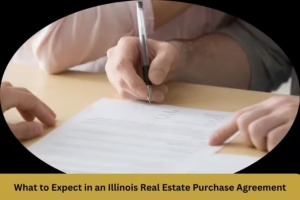Buying or selling a home in Illinois is a significant legal transaction, and it all begins with a real estate purchase offer.
Whether you’re a buyer eager to land your dream home or a seller reviewing offers, it’s crucial to understand what this offer should include to make it legally binding and clear to all parties involved.
At The Real Estate Law Firm, we help Illinois buyers and sellers draft, review, and negotiate purchase offers that protect their interests and ensure smooth closings. In this article, we’ll break down the key elements that every Illinois real estate purchase offer should include.
Learn how we simplify residential transactions.
10 Key Elements Every Illinois Real Estate Offer Must Include
1. Buyer and Seller Information
The purchase offer must clearly identify both the buyer(s) and the seller(s) involved in the transaction. This includes full legal names and contact information. Mistakes here can cause delays or legal complications later in the process.
Tip: Make sure names match the official documents like ID or title deeds.
2. Property Description
An accurate legal description of the property is essential. This goes beyond just the address—it should include the parcel number, lot description, and any identifying details from the county assessor’s records.
The Real Estate Law Firm always recommends referencing the legal description found in the title deed or prior sale documents.
3. Purchase Price and Financing Details
The offer must state the proposed purchase price for the property. It should also specify:
-
How the buyer intends to finance the purchase (cash, mortgage loan, FHA/VA loan, etc.)
-
The amount of earnest money to be deposited
-
Loan contingencies or financing deadlines
If the buyer is obtaining a mortgage, it’s important to include terms like the type of loan, interest rate caps, and time limits for loan approval.
4. Earnest Money Deposit
Earnest money is a good-faith deposit showing the buyer’s serious intent to purchase. In Illinois, this amount typically ranges from 1% to 3% of the purchase price and is held in an escrow account until closing.
The purchase offer should clearly indicate:
-
The amount of earnest money
-
When and how it will be paid
-
The circumstances under which it is refundable or forfeited
The Real Estate Law Firm can help you structure earnest money clauses that are both fair and legally sound.
5. Contingencies
Contingencies are conditions that must be met before the sale can proceed. Common contingencies in Illinois include:
-
Home inspection contingency – Gives the buyer the right to back out or renegotiate if major issues are discovered.
-
Financing contingency – Protects the buyer if they are unable to secure a mortgage.
-
Appraisal contingency – Allows renegotiation if the property does not appraise at the offer price.
-
Sale of current home – Makes the offer contingent on the buyer selling their existing property.
Each contingency should have clear timelines and consequences for non-performance.
6. Closing Date and Possession
The offer must include a proposed closing date, which is the day the property changes ownership, and when the buyer will take possession of the home.
Illinois real estate closings typically happen 30 to 60 days after offer acceptance, but timelines can vary.
Note: The possession date may or may not be the same as the closing date—be specific in the contract to avoid disputes.
7. Included and Excluded Items
The offer should clearly list which items will be included in the sale (e.g., appliances, window treatments, lighting fixtures) and what is excluded (e.g., a chandelier the seller intends to keep).
Ambiguity here can lead to misunderstandings and even litigation. That’s why The Real Estate Law Firm always advises being overly clear.
Work with a team that leaves no detail out.
8. Prorations and Tax Responsibilities
In Illinois, it’s standard for property taxes to be prorated based on the current year’s taxes, even though they’re paid in arrears. The offer should spell out:
-
Who is responsible for paying what portion of the taxes
-
How property taxes, utilities, and HOA fees will be prorated at closing
This ensures there are no surprises for either party.
9. Attorney Review Period
Illinois allows a five-business-day attorney review period after both parties sign the offer. During this time, either side’s attorney can propose modifications or cancel the agreement.
The Real Estate Law Firm strongly encourages buyers and sellers to take full advantage of this review window to protect their rights.
10. Signatures and Dates
A real estate purchase offer is not legally binding until it’s signed by both buyer and seller. Each party must date their signature, and all counterparts should be consistent.
Digital signatures are acceptable in Illinois, provided they meet state requirements.
Bonus: Optional Clauses to Consider
Some additional clauses that buyers and sellers may wish to include:
-
Home warranty clause
-
Repair credit agreement
-
Title company preference
-
Lead-based paint disclosure (for homes built before 1978)
The Real Estate Law Firm helps clients assess what optional clauses are worth including based on the specific property and buyer/seller needs.
Why a Real Estate Attorney is Essential
In Illinois, real estate attorneys play a vital role in reviewing contracts, negotiating terms, and ensuring compliance with state laws. Without professional guidance, buyers and sellers may leave themselves exposed to financial or legal risks.
Let The Real Estate Law Firm walk you through your next offer—we specialize in protecting your rights and securing your peace of mind from offer to closing.
Conclusion
A real estate purchase offer is the cornerstone of a successful transaction in Illinois. From the legal property description and earnest money terms to financing and contingencies, each section must be carefully crafted to protect your interests.
Don’t leave the fine print to chance—let the experienced team at The Real Estate Law Firm help you draft or review your offer. We ensure your agreement is clear, compliant, and in your best legal interest.
Contact us today to get legal clarity.
FAQs:
-
Is a purchase offer legally binding in Illinois?
Yes, once both buyer and seller sign it, the offer becomes a binding contract—subject to any contingencies or attorney review. -
Can I make an offer on a home without a real estate agent?
Yes, but it’s strongly recommended to involve a real estate attorney, like those at The Real Estate Law Firm, to draft or review the offer. -
How much earnest money should I offer in Illinois?
Typically, 1–3% of the purchase price, though this can vary based on market conditions. -
What happens if I miss the attorney review window?
You may be locked into the original terms of the contract. Always act quickly to consult your attorney after signing. -
What if the seller doesn’t respond to my offer?
If the seller doesn’t respond by the deadline stated in the offer, the offer expires and is no longer valid. -
Are verbal offers valid in Illinois real estate?
No. All real estate purchase agreements must be in writing to be enforceable under Illinois law. -
Can I back out of an offer after signing?
Only if contingencies allow or during the attorney review period. Otherwise, you may face legal or financial penalties. -
Should I include appliances in my purchase offer?
Yes. Clearly specify which appliances or fixtures stay with the property to avoid disputes later. -
What is a contingency, and do I need one?
Contingencies are conditions that protect you. Common ones include financing, inspections, and appraisals. Most buyers should include at least one. -
Do I need a lawyer to write my offer?
Yes, in Illinois, it’s highly recommended. The Real Estate Law Firm provides expert legal support to ensure your offer is legally sound.




